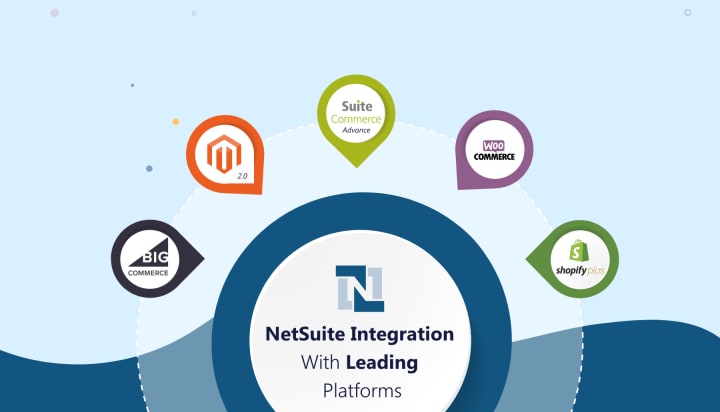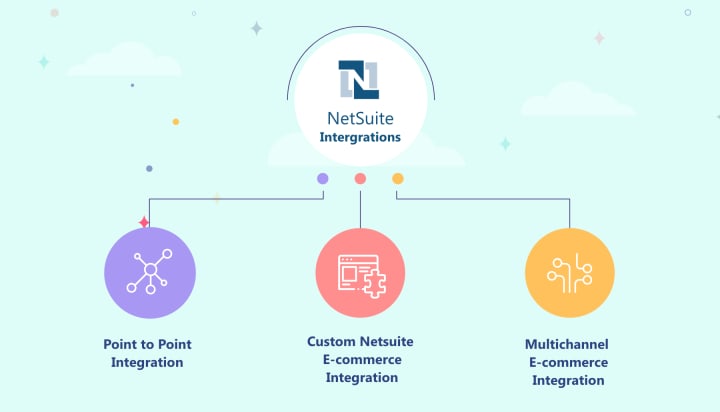How NetSuite E-Commerce Integration Helps You Build Your Online Store In Less Than 100 Hours?
NetSuite and eCommerce connection

With this blog, you will get to know how NetSuite eCommerce integration will bring ease to all eCommerce business website activities. How all the activities from inventory management to order management can be handled with a single system and what all NetSuite integrations can be performed by NetSuite eCommerce partners.
NetSuite eCommerce Integration Solutions - The Intelligent Way To Give An Edge To Your E-Commerce Business
NetSuite no longer just remains an ERP solution, but it has emerged also as a powerful eCommerce platform that offers better value than the majority of eCommerce specific platforms. No wonder, NetSuite integration services for eCommerce website continues to be popular.
NetSuite can be an integrated and comprehensive e-commerce solution to manage data, sales transactions, and payments for any eCommerce store. On the other hand, you can also integrate NetSuite with other leading eCommerce solutions and stores.
Thanks to NetSuite website integration, businesses now get a comprehensive solution to manage all financial aspects, inventory, product pricing, payments, billing and transactions, customers, vendors, and pretty much everything that a business needs to handle.
Difficulties With Segregated Systems And The Advantage Of An Integrated Solution
Do you have an eCommerce store that in size and product range goes well beyond the tiny family store in your vicinity? Well, in that case with the integrated e-commerce solution of NetSuite you can enjoy deeper control over all the business operations.
Any online store already using NetSuite as their integrated eCommerce solution, finds the continuous data flow as a key advantage. When your business continues to grow, this data can be utilized to optimize the entire business and make way for business process automation allowing optimizing scalability on every level.
On the other hand, there are several key challenges when you handle separate ERP and eCommerce platforms. The biggest challenge is that the product and inventory data will be managed in different locations. This will only make delays in processing the orders. This can actually end up in the loss of sales as customers will not order products with the Out of Stock tag.
There is also the challenge of customer management with separate solutions. Particularly, in business to business (b2b) eCommerce companies, offering very specific prices as per the customer insights is important. But this will not be possible without integrated access to customer data.
An integrated solution offering access to all customer data in a seamless manner will also help the sales professionals to update the pricing in actual time when a B2B sale is on the offing. This is why SuiteCommerce Advanced, a NetSuite e-commerce solution has gained so much traction in the B2B segment.

Difficulties With Segregated Systems And The Advantage
4 Benefits Of Integrating a NetSuite and E-Commerce Website
Here let's have a quick look at the key benefits of integrating NetSuite with e-commerce stores for an integrated, seamless, and smooth business process.
- An integrated solution can manage volumes of multifaceted customer and business data to deliver relevant and actionable insights.
- NetSuite is more equipped to handle diverse transaction types because of the robust and unparalleled scope of customization as per the business.
- NetSuite e-commerce platforms and tools also offer an exhaustive range of tools to take care of e-commerce development, management, and optimization.
- Optimum scope of scalability irrespective of business growth and outreach is another key advantage.
These advantages are exemplified by the way companies that already integrated NetSuite with their eCommerce businesses are outgrowing other businesses that still rely on separate legacy systems.
Which Ecommerce Platforms Allow Integration With NetSuite?

Almost all major eCommerce platforms at present allow integration with NetSuite. NetSuite has already established itself as a powerful solution in the eCommerce industry and this made all major platforms build plugins to facilitate a smooth integration.
For NetSuite integration with your e-commerce store, some of the top standalone e-commerce CMS systems that should be named include SuiteCommerce Advanced (SCA), Magento 2.0, BigCommerce, Shopify Plus, and WooCommerce. Netsuite integration with Magento is already popular and is being used by several leading e-commerce stores.
How NetSuite eCommerce Integration Facilitates A Never-Before Shopping Experience?
NetSuite has already established itself as the leading integrated e-commerce platform not just because of the professional and expertise-driven way it handles data, but also because of the easy and engaging shopping experience it ensures.
NetSuite allows streamlined and precision-driven data processing along with the automation in processes.
Allows seamless navigation experience that motivates users to make actual purchases from the store.
NetSuite integration reduces or minimizes the need for human intervention for crucial tasks such as reporting and data export. This results in more precision and accuracy.
NetSuite integrated system helps to manage information in a centralized manner across several channels.
Thanks to the streamlined and real-time data processing, businesses can see when the inventory needs to be moved between locations.
Thanks to the data-driven insights from integrated NetSuite eCommerce ERP businesses can also know the regions where they need to focus on marketing and the ways to go about it.
NetSuite integrated solution also helps to synchronize data across multiple eCommerce platforms.
Different Options for NetSuite and eCommerce Integration

Finally, it is time to ask about the process and available options for integrating NetSuite with e-commerce stores. Let us get this word of caution that without following the proper integration method, the entire project can just get into a messy situation.
This is why it is important to prepare for the challenges well in advance and choose the right integration approach. This will help you get relieved of many issues that can potentially take your business into jeopardy.
You basically have three times tested ways to integrate NetSuite with the eCommerce store. They are respectively point-to-point integration, custom NetSuite e-commerce integration, and multichannel integration.
Point-to-Point Integration
This is the most common and easier method offered by most integration providers. The point-to-point integration of NetSuite ERP basically refers to the direct services without any operational hub to handle different channels and corresponding customizations.
Such solutions are generally less expensive and are ideal for small stores and retailers when they need to start with a NetSuite solution. On the downside, this type of solution is the least flexible and very less sophisticated to allow a multichannel business strategy. Since it only allows connection on a 1:1 ratio, the entire system depends on a single connection.
Do you want to start small and are not sure of catching growth stories very soon? In that case, this NetSuite integration method can be a good option. But if you are ambitious enough and us expecting fast growth, you should look for other options.
Custom NetSuite eCommerce Integration
If you can afford it and if the resource availability is not a big problem, you can always opt for in-house NetSuite eCommerce integration. This will need connecting the systems through APIs to facilitate smooth data workflows.
The major constraint of this approach is the need of having an in-house team of IT experts having exposure to NetSuite and e-commerce. On the upside, this will give you more control, a lot of freedom, and space to carry out the integration over a period of time.
The major drawback of this approach is the rigid environments that developers need to work with. On top of that, this method involves a sustainable cost burden thanks to a new IT team.
Multichannel eCommerce Integration
The multichannel e-commerce integration unlike the point-to-point integration method creates a fully-fledged operation hub between the NetSuite and the specific eCommerce channel to help easy synchronization of data between the two platforms.
There will be pre-built connectors to connect multiple e-commerce channels with your website. Since there are multiple connectors, you enjoy enhanced flexibility for tweaking configuration across channels.
On the downside, the multichannel integration is more expensive but is still cheaper in contrast to the fully-fledged custom integration involving in-house teams of experts. An expert NetSuite integration partner will take care of everything.
Naturally as a balanced as well as scalable solution multichannel integration stands out from the rest. It is perfectly suitable for small and medium businesses and enterprises on the steady growth track.
Conclusion
NetSuite e-commerce is here to stay and thrive. It is already the most trending and popular ERP system with robust tools and capabilities to deliver a comprehensive e-commerce store management experience. With NetSuite e-commerce on your side, all your worries regarding data management, customer insights, and store experience will be taken care of automatically.
Original Source: VNMT Solutions
About the Creator
VNMT Solutions
VNMT Solutions is a NetSuite alliance partner and consultant solution provider with a global footprint and industry-acclaimed services. Starting our journey in 2017 and headquartered in Melbourne, Australia.
https://www.vnmtsolutions.com






Comments
There are no comments for this story
Be the first to respond and start the conversation.